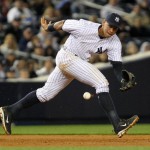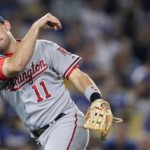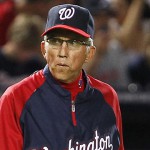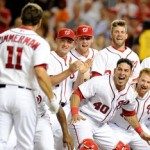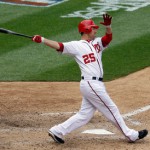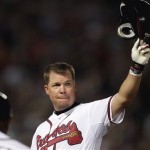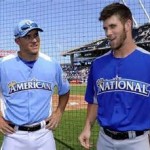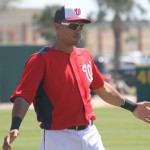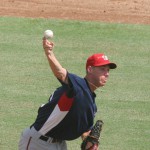With somewhat of a lack of topics to write about lately, I turned to find a relatively deep Ask Boswell discussion on the Washington Post website 8/19/13. Tom Boswell takes baseball questions, I provide my own answers.
As always, I’ll write answers here before reading his, and edit questions for clarity. All stats quoted are as of 8/19/13.
Q: Leave it to the Red Sox to make A-Rod into a sympathetic figure!
A: Agree. I wouldn’t normally have tuned into the expected 4.5 hour 8pm Sunday night game between Boston and New York, but just happened to see the first Alex Rodriguez at bat last night. My immediate thought: Ryan Dempster‘s actions were pretty gutless and he should have been immediately ejected. You throw at a guy once and miss? You’ve made your point. You had your chance to make a statement and missed. But then throw two more balls inside then blatantly drill the guy on 3-0? Sorry; that’s just bush league. The umpires badly mismanaged that situation; Dempster should have been immediately ejected. Joe Girardi had a very legitimate point at the time, and continued with very intelligent observations afterwards (where, paraphrased, he said that Dempster was a union rep, should have known better, and if he had a problem with the process of his own players’ union the time and place was elsewhere, not on a nationally televised game).
So, yeah, Alex Rodriguez did earn sympathy there. How poetic was his home-run later in the game? Were it me, I would have milked it for everything it was worth, making it a poster child for every egregious home-run celebration. Bat flip, slow trot, kisses to the stands, fist pumps and multiple pointing to the sky. But that’s just me.
Boswell doesn’t really say much about the question other than stating the obvious about the athlete and the situation.
Q: Wouldn’t it be better to show up the Braves by actually beating them once in a while, rather than throwing at them?
A: Not the point. As I posted in this space over the weekend, there’s a code in the game that the Nats, for some unknown reason, were not keeping to. Kudos to Stephen Strasburg for finally standing up for his own. It has nothing to do with wins or losses on the field, it has to do with protecting yours. Boswell says the Justin Upton plunking was done perfectly, but then questions the ejection for what a lot of people thought were just very wild pitches to Andrelton Simmons.
Q: Why did the Nats not keep Oliver Perez?
A: Who said it was just the Nats decision? Oliver Perez piched as a starter for our AA team in 2011 and then signed another minor league deal with Seattle for 2012. Only then he converted to a reliever and has had success since. We don’t really know what happened; maybe the Nats offered to keep him but wouldn’t promise a AAA spot or a spring training invite. Maybe Perez saw our rotation for 2012 and thought Seattle would give him a better shot at a MLB job. Honestly I don’t remember a single word at the time indicating that either side wanted a 2012 deal. Perez was good but not great in AA for us in 2011 (3-5, 3.09 ERA. 1.3 whip in 15 starts), far less than a guy who was once a very effective MLB starter. Maybe we just though he was washed up. Boswell questions whether a guy with a 4.25 ERA is even worth discussing. Fair point
Q: Who would the Nationals “third-string” catcher be? If, for instance, Suzuki got injured and Ramos pinch-hit. -Who would be the preferred position player to pitch if they ran out of pitchers?
A: Great question. 3rd string catcher? I have no idea, maybe Steve Lombardozzi. I do remember the team saying that despite Bryce Harper‘s youth position being predominantly catcher that he was not an option. Pitcher? Boy, another who knows. I can’t remember a single positional player who has taken the mound for the Nats since they moved here. The best guess would be a utility guy, either Lombardozzi or Scott Hairston. Boswell guesses the same names I do.
Q: Do you think the Nats will make a serious effort to keep him next year? (I’m already writing off 2013) I’m sure he wants to play every day, but given Ramos’ physical issues that isn’t out of the question.
A: Kurt Suzuki is gone. His $8.5M option for next year is way, way too much for what he has become; a once-a-week catcher. Even given Wilson Ramos‘ fragility, you just can’t waste money at the backup catcher position. Look for a 2014 spring training fight between Sandy Leon and Jhonatan Solano for the #2 catcher spot, and look for the team to add a lot of depth in the minor league ranks in the off-season. Boswell notes the horrific catcher ERA of Suzuki compared to Ramos, and predicts a minor FA signing this coming off-season.
Q: Is there a more insincere human being in sports than A-Rod? Has he always been like this?
A: The above answer was my weekly quota of Alex Rodriguez discussion. I will say this though; how do you really KNOW that A-rod is an “insincere human being?” Do you know him personally? Or are you just following the media narrative? Boswell makes a good point; the damage he’s done to the game outweighs any sympathy you could have for him.
Q: You’ve said in the past the Nats would return to their career averages…eventually. Are the Nats reverting to their mean, or is this the new mean?
A: If 2012 was the high, maybe 2013 is the low. Lets hope for somewhere in the middle for 2014. Hell, i’ll settle for league average. I did a quick little runs-scored analysis at the end of June that showed where the Nats record would have been if they had a league-average offense (tied for 1st place) or their 2012 offense (best record in majors). You could quibble with the math, but I think we all know what has let down the team this year. Boswell summarizes many of the same points I made … and then has some great stats isolating the bench’s collapse this year.
Q: Given Haren’s performance since returning from the DL, does Rizzo make him a qualifying offer for 2014?
A: Good question. I just don’t see how you can give Dan Haren a qualifying offer. The Q.O. amount is going to increase; lets assume its $14M/year. Would you give a guy with this stat line $14M? 7-11, 4.79 ERA? Probably not (those are his season numbers). His last 8 games (since coming off D/L?) 3-2, 2.25 ERA. Yeah, that’s worthy of a Q.O. Maybe the team avoids having to make a decision and flips him to someone needing a starter for September, since he passed through waivers. That’d be advantageous to Haren too, meaning his signing next off-season won’t have compensation associated with it. In any case, I think the performance of Taylor Jordan has clearly made Haren expendible, giving as good as or better performance for 1/26th the cost. Use that $13M towards some hitting. Boswell says no.
Q: When does Drew Storen replace Soriano as the Nats closer? (After another blown save).
A: When Soriano’s contract is over. You bought him, you’ve gotta use him. Rafael Soriano‘s m.o. was always “good when he’s the closer, sullen underperformer when not.” He was a poor signing when they got him, and continues to be wasted money. But hey, its not my money. Boswell agrees.
Q: When Magic Johnson’s group purchased the Dodgers, he was going to fire Mattingly, whom you said would be a very good manager. Does he still want to fire Donnie, now that the Dodgers have gone 42-8, the best MLB win stread in 100 years? Would you like to see him managing the Nats?
A: Well of course Don Mattingly isn’t going to be fired; he’s now neck and neck with Clint Hurdle for manager of the year. I don’t have a good sense for what kind of manager he is; after Davey Johnson‘s laissez-faire attitude I know what kind of manager I do want; I want someone with some emotion. Girardi proved a lot to me last night; lighting into an umpire who failed to control the game. That’s the kind of emotion I want in my skipper. Boswell gives some good managerial candidates.
Q: Who are the young pitchers the Nats thing are coming soon?
A: From AAA on downwards, here’s a few starters to keep an eye on: Nathan Karns, A.J. Cole, Robbie Ray, Taylor Hill, Sammy Solis, Matthew Purke, Blake Schwartz, Jake Johansen, Austin Voth and Lucas Gilioto. Almost every guy on this list has performed well and/or earned a promotion in 2013. Boswell points some of these guys out and then mentions that we need to produce some hitting too.
Q: Should I be worried that the Nats are going to become the new Caps, a talented team who just lacks the discipline to get it done when it matters?
A: No, because at its heart this is still the same basic team of guys who nearly won 100 games last year. They need a new voice in the skipper’s office, one who reverses the course of Johnson and who properly motivates them. Boswell says not to judge a team because of 3/4’s of one disappointing season.
Q: Zim’s surgically-repaired shoulder clearly affected his throwing this year — whether physically or mentally. However, his power numbers at the plate are down too, and we haven’t seen his usual late summer hot streak. Do you think his shoulder affected his hitting? If so, what’s the prognosis for next year for Zim’s hitting?
A: If his shoulder really is/was as bad as everyone seems to think, then yeah you can derive all sorts of bad performance indicators from it. Next year? Who knows; he should be healthy. Of course, he was promised to be healthy by spring training of THIS year. It takes me back to what I now perceive as disinformation from the team about the whole shoulder issue from the onset. Either way, I think he’s playing 3B for this team in 2014 no matter what (well, unless the team somehow unloads Adam LaRoche). Boswell shows some good stats showing Zimmerman’s consistency over the years, then goes on to rave about Jayson Werth.
Q: Will baseball be ruined by the addition of instant replay or have the times changed?
A: I think times have changed. But from all accounts, the implementation will be typical of everything MLB does; half-done, ham-handed, inefficient and not going nearly as far as its counterparts. Boswell isn’t a fan.
Q: With two years under his belt, he has a 3.00 ERA and a pretty good 27-19 record. He doesn’t hit 100 mph anymore. He hasn’t proven so far to be anything better than mediocre in the clutch. Not a bad track record, of course, but not anywhere near great. He’s 25 years old now. Is it time to adjust expectations?
A: Is this a baiting question? Quotes ERA and W/L record as the sole ways to evaluate a pitcher (especially a pitcher who hasn’t yet pitched a full season). What proof is there that he’s “mediocre in the clutch?” He’s still the highest or 2nd highest average fastball of any starter in the league despite dialing it down, he’s still a league leader in K/9. His ERA+ is still significantly above average both for this year and for his career. What more do you want from the guy? Ask any baseball pundit to give you a list of his top 5 starters in the league and he’s still on it. Boswell gives some great historical stats, putting Strasburg in pretty elite company thus far.
Q: Why has Bryce Harper not made the 20 year old leap we expected him to? Did the collision with the wall in LA derail his entire season?
A: A fair point; everyone saw his splits pre and post-LA wall. His lefty splits are abhorrent. But he hasn’t been the second coming of Mike Trout. Maybe we just need to appreciate him for what he is right now. Boswell mirrors what I said.
